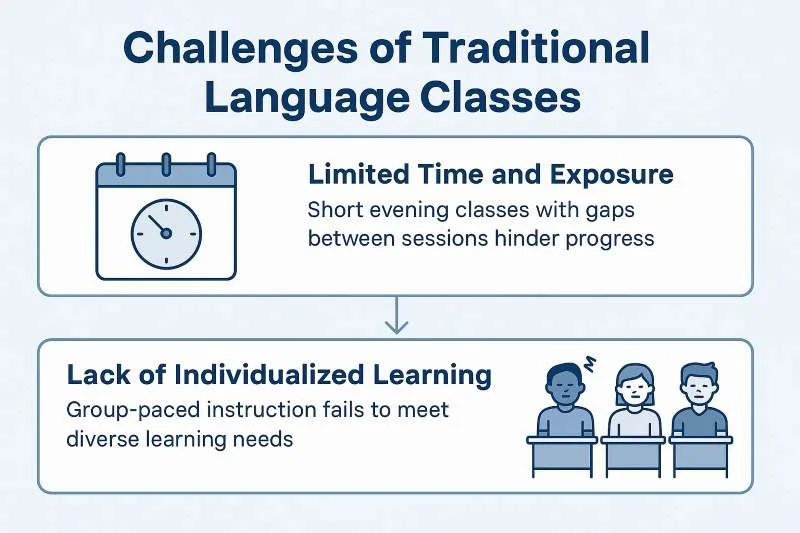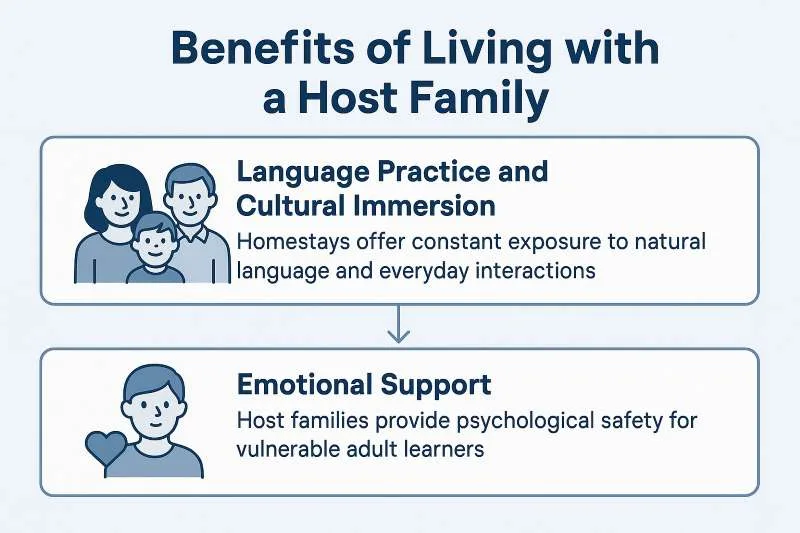Special Offer
From November 1, 2025 to March 31, 2026
View details
- 2 FREE outings per week with the host teacher!
- For students aged 18 and over
- Available in all 30+ destinations
- Valid for 15, 20, or 25h lessons per week with options (general activities, cultural visits, sports, business vocabulary, exam preparation, etc.) or without
- Bookings must be made and completed during the promotional period
All programmes include full-board accommodation in the teacher’s home and immersive interaction with the host and their family.
- 2 FREE outings per week with the host teacher!
- For students aged 18 and over
- Available in all 30+ destinations
- Valid for 15, 20, or 25h lessons per week with options (general activities, cultural visits, sports, business vocabulary, exam preparation, etc.) or without
- Bookings must be made and completed during the promotional period
All programmes include full-board accommodation in the teacher’s home and immersive interaction with the host and their family.
Picture this: Sarah, a 35-year-old marketing executive, has been taking evening Spanish classes for three years. Despite her dedication and countless hours of grammar exercises, she still freezes when trying to order coffee during her business trips to Madrid. Her experience mirrors that of millions of adult language learners worldwide who find themselves trapped in the limitations of traditional classroom-based learning methods.
The stark reality is that conventional language learning approaches often fail adult learners seeking true fluency. Research conducted by Georgetown University Medical Center reveals a compelling truth: adults learning a foreign language in immersion settings develop native-like brain processing patterns, while those confined to classroom-only instruction never achieve this neurological milestone. Furthermore, studies published in Psychological Science demonstrate that immersed learners consistently outperform their classroom counterparts in both comprehension and production tasks, achieving measurably superior L2 proficiency.
The difference isn’t merely academic—it’s transformational. While traditional methods may teach you to conjugate verbs and memorize vocabulary lists, they rarely prepare you for the spontaneous, culturally nuanced conversations that define real-world language use. This fundamental gap between classroom theory and practical application explains why so many dedicated adult learners remain perpetually intermediate, despite years of study.
This comprehensive guide will illuminate the path toward choosing a language study abroad program that actually delivers results. We’ll explore why traditional approaches fall short for adult learners, examine the proven benefits of immersion programs, and provide you with the essential criteria for selecting a program that transforms your language learning journey from frustrating struggle to remarkable success.
Table of Contents
- Why Traditional Language Programs Don’t Work for Adults
- Key Benefits of Language Immersion Programs
- Essential Features to Look for in Adult Language Programs
- Accommodation Options That Enhance Learning
- Teaching Methodology That Works for Adults
- Program Flexibility for Working Professionals
- Making the Most of Your Language Stay
- How Je Suis Polyglotte Enhances Adult Language Learning
Quick Summary
| Program Aspect | What to Look For | Why It Matters |
|---|---|---|
| Learning Environment | Total immersion with native speakers | Accelerates acquisition through constant exposure |
| Accommodation | Host family with qualified teachers | Combines learning with authentic cultural experience |
| Teaching Method | One-on-one personalized instruction | Adapts to individual learning style and pace |
| Schedule Flexibility | Customizable duration and intensity | Accommodates working professional constraints |
| Cultural Integration | Daily life participation opportunities | Develops practical communication skills |
| Support System | Personalized guidance and monitoring | Ensures optimal placement and progress |
Why Traditional Language Programs Don’t Work for Adults
The fundamental flaw in conventional language education lies in its disconnect from how adults actually acquire and retain new languages. Unlike children, who absorb languages naturally through play and social interaction, adults require structured yet authentic learning environments that bridge the gap between theoretical knowledge and practical application.
Limited Real-World Practice Opportunities
Traditional classroom settings create an artificial learning bubble that bears little resemblance to authentic communication scenarios. Students spend hours perfecting grammar exercises and memorizing vocabulary lists, yet struggle to navigate a simple conversation with a native speaker. This phenomenon occurs because classroom practice typically involves controlled, predictable exchanges between fellow learners who share the same linguistic limitations and cultural background.
The absence of spontaneous, unscripted interactions means that learners never develop the cognitive flexibility required for real-world communication. When faced with unexpected questions, cultural references, or colloquial expressions, classroom-trained students often find themselves paralyzed, despite their theoretical knowledge of the language structure.
Rigid Classroom Schedules That Don’t Suit Working Professionals
The traditional academic calendar and fixed class schedules create insurmountable barriers for working adults. Evening classes, typically offered twice weekly for 90-minute sessions, provide insufficient exposure to achieve meaningful progress. This fragmented approach forces learners to constantly restart their linguistic momentum, as the gaps between sessions allow newly acquired knowledge to fade before it can be consolidated.
Moreover, the group-paced progression means that individual learning needs are rarely addressed. Fast learners become bored and disengaged, while those requiring additional support fall behind, creating a frustrating experience that often leads to abandonment of language learning goals altogether.

Generic Curriculum Not Tailored to Adult Learners’ Needs
Most language programs employ curricula designed for academic settings rather than professional or personal communication needs. Adult learners typically have specific goals—advancing their careers, communicating with international colleagues, or enhancing travel experiences—yet find themselves studying topics irrelevant to their objectives.
The emphasis on academic writing and literary analysis, while valuable in certain contexts, fails to address the practical communication skills that adults most urgently need. Business professionals require industry-specific vocabulary and formal communication protocols, while travelers need conversational skills and cultural awareness that textbooks rarely provide.
Lack of Cultural Context and Authentic Interaction
Language and culture are inextricably linked, yet traditional programs often treat them as separate subjects. Students learn grammatical structures without understanding the cultural nuances that determine when and how to use them appropriately. This cultural blindness leads to technically correct but socially inappropriate communication that can hinder rather than help professional and personal relationships.
The absence of native speaker interaction compounds this problem. Learning from non-native instructors, while valuable for understanding learning challenges, limits exposure to authentic pronunciation, intonation, and cultural expressions that define fluent communication.
Key Benefits of Language Immersion Programs
Language immersion represents a paradigm shift from artificial classroom learning to authentic, context-rich acquisition that mirrors how humans naturally develop linguistic competence. The benefits extend far beyond mere vocabulary expansion, fundamentally rewiring the brain’s approach to language processing and cultural understanding.
Accelerated Language Acquisition Through Daily Practice
Immersion environments provide the constant linguistic exposure that adult brains require to form lasting neural pathways. Research published in Psychological Science demonstrates that immersed learners achieve superior L2 proficiency compared to classroom counterparts, with brain imaging studies revealing native-like processing patterns that develop only through intensive, authentic exposure.
The acceleration occurs because immersion eliminates the artificial boundaries between “study time” and “real life.” Every interaction—from ordering breakfast to discussing current events—becomes a learning opportunity that reinforces linguistic patterns through meaningful context. This constant reinforcement creates the repetition necessary for long-term retention while maintaining the engagement that sustains motivation.
Unlike classroom drills that quickly fade from memory, immersion experiences create emotional and contextual associations that anchor new language elements in long-term memory. The neurological principle of “use it or lose it” works in favor of immersed learners, as daily necessity ensures continuous activation of newly acquired linguistic skills.
Cultural Understanding Through Lived Experience
True language fluency encompasses far more than grammatical accuracy and vocabulary breadth—it requires deep cultural competence that can only be developed through authentic social interaction. Immersion programs provide unprecedented access to the subtle cultural codes that govern appropriate communication in different contexts.
Living with native speakers reveals the unwritten rules of social interaction: when to use formal versus informal address, how to interpret non-verbal communication, and which topics are appropriate for different relationships. These insights, impossible to convey through textbooks, prove crucial for professional success and personal relationship building in international contexts.
The cultural learning extends beyond language to encompass worldview expansion. Immersed learners develop empathy and cross-cultural competence that enhances their personal and professional effectiveness long after the program concludes. This global perspective becomes increasingly valuable in our interconnected world, where cultural sensitivity often determines business success and personal fulfillment.
Flexible Scheduling for Working Professionals
Quality immersion programs recognize that adult learners have complex lives requiring flexible arrangements. Unlike rigid academic schedules, immersion allows for customized timing that accommodates professional responsibilities while maximizing learning effectiveness.
The beauty of immersion lies in its integration with daily life rather than addition to an already crowded schedule. Learning occurs naturally throughout the day, eliminating the need for separate study time while providing more comprehensive exposure than traditional programs could offer in months of evening classes.
Professional immersion programs often incorporate work-related activities, allowing participants to develop industry-specific language skills while maintaining career momentum. This integration proves particularly valuable for executives and professionals who cannot afford extended absences from their responsibilities.
Personalized Attention and Customized Learning Plans
The individualized nature of quality immersion programs addresses the primary weakness of group-based instruction: the inability to adapt to individual learning styles, pace, and objectives. Personalized programs begin with comprehensive assessment of current proficiency, learning preferences, and specific goals, creating a customized roadmap for achievement.
This individualization extends to teaching methodology, with instructors adapting their approach based on real-time feedback and progress assessment. Visual learners receive graphic and contextual support, while auditory learners benefit from conversation-heavy instruction, and kinesthetic learners engage through hands-on cultural activities.
The immediate feedback loop inherent in one-on-one instruction allows for rapid correction of errors before they become ingrained habits. This prevents the fossilization of incorrect patterns that plague many self-taught or group-taught learners, ensuring that progress builds on solid foundations.
Essential Features to Look for in Adult Language Programs

Selecting an effective language study abroad program requires careful evaluation of specific features that distinguish transformative experiences from expensive disappointments. Adult learners, with their unique constraints and objectives, must prioritize programs that address their particular needs while delivering measurable results.
Comprehensive Needs Assessment and Goal Setting
Exceptional programs begin with thorough assessment of your current proficiency level, learning style preferences, and specific objectives. This initial evaluation should extend beyond simple placement tests to include detailed discussions about your professional requirements, personal interests, and timeline constraints. Research published in Foreign Language Annals demonstrates that programs incorporating comprehensive pre-departure assessment and goal-setting achieve significantly higher satisfaction rates and learning outcomes.
The assessment process should identify not only your current linguistic competencies but also your preferred learning modalities, cultural comfort zones, and specific communication scenarios you need to master. This information becomes the foundation for customizing every aspect of your program, from host family selection to activity planning.
Qualified and Experienced Instructors
The quality of instruction represents the most critical factor in program success. Look for programs that employ certified teachers with specific training in adult language acquisition and cross-cultural communication. Unlike traditional classroom teachers, immersion instructors must possess the flexibility to adapt their methodology to real-world contexts while maintaining pedagogical rigor.
Effective immersion instructors understand the unique challenges facing adult learners, including time constraints, professional pressures, and the psychological barriers that often inhibit language production. They should demonstrate proven experience in helping working professionals achieve their specific communication goals within realistic timeframes.
Structured Yet Flexible Curriculum
The most effective programs balance structured learning objectives with the flexibility to capitalize on spontaneous learning opportunities. This approach ensures systematic progress through essential language elements while allowing for organic exploration of topics that emerge from daily experiences.
Quality programs provide clear learning milestones and regular progress assessments, enabling both instructors and learners to track advancement and adjust strategies as needed. The curriculum should integrate formal instruction with practical application, ensuring that theoretical knowledge translates into functional communication skills.
Cultural Integration Opportunities
Language learning divorced from cultural context produces technically correct but socially ineffective communication. Exceptional programs provide structured opportunities for cultural immersion that extend beyond tourist experiences to include authentic participation in local life.
These opportunities might include professional networking events, community volunteer activities, or participation in local clubs and organizations. The key is ensuring that cultural experiences serve specific language learning objectives rather than functioning as mere entertainment.
Accommodation Options That Enhance Learning
The choice of accommodation profoundly impacts both the intensity and effectiveness of your language learning experience. Different options serve different learning styles and objectives, making careful selection crucial for program success.
Host Family Benefits for Cultural Immersion

Living with a carefully selected host family provides unparalleled opportunities for authentic language practice and cultural understanding. Research conducted at St. Cloud State University reveals that students living with host families demonstrate significantly greater language gains compared to those in alternative accommodations, with the homestay environment providing optimal conditions for intensive language input and cultural immersion.
Host families offer constant exposure to natural speech patterns, colloquial expressions, and cultural nuances that textbooks cannot convey. Daily interactions—from breakfast conversations to evening discussions about current events—provide continuous practice opportunities in low-pressure, supportive environments.
The emotional support provided by host families proves particularly valuable for adult learners who may feel vulnerable when struggling with basic communication. This psychological safety net encourages risk-taking and experimentation essential for language development.
Teacher Family Homestays: The Ultimate Learning Environment
The pinnacle of immersion accommodation combines the cultural benefits of host family living with the pedagogical expertise of qualified language instruction. Teacher family homestays, offered by specialized programs like Je Suis Polyglotte, provide 24-hour access to professional language instruction integrated seamlessly into daily life.
This arrangement eliminates the artificial separation between formal lessons and practical application, creating a continuous learning environment where every interaction serves educational purposes. Meals become vocabulary lessons, household activities transform into grammar practice, and evening conversations develop into sophisticated discourse training.
The personalized attention available in teacher family settings allows for immediate correction of errors, preventing the fossilization of incorrect patterns that plague many language learners. This real-time feedback loop accelerates progress while building confidence through supportive, patient instruction.
Private Apartment Considerations
Independent accommodation appeals to learners who prefer privacy and autonomy, but it requires careful consideration of its impact on language learning objectives. While private apartments offer comfort and flexibility, they significantly reduce opportunities for spontaneous language practice and cultural immersion.
Adult learners choosing independent accommodation must actively seek interaction opportunities to compensate for the reduced exposure inherent in this choice. This might include joining conversation groups, participating in community activities, or arranging regular social interactions with native speakers.
The success of independent accommodation depends largely on the learner’s self-motivation and ability to create structured practice opportunities outside formal instruction time. For highly disciplined learners with specific professional objectives, this option can provide the focused environment necessary for intensive study.
Teaching Methodology That Works for Adults
Adult language acquisition requires pedagogical approaches that acknowledge the unique cognitive and psychological characteristics of mature learners. Effective methodologies leverage adults’ analytical abilities while addressing the inhibitions and time constraints that often impede progress.
One-on-One Instruction Benefits
Individual instruction represents the gold standard for adult language learning, providing the personalized attention and customized pacing that group settings cannot offer. Research from the Center for Advanced Research on Language Acquisition at the University of Minnesota indicates that adult learners in one-on-one settings achieve proficiency milestones significantly faster than those in group instruction.
The immediate feedback available in individual instruction prevents the development of fossilized errors while building confidence through patient, supportive correction. Instructors can adapt their methodology in real-time based on learner responses, ensuring optimal challenge levels that promote growth without overwhelming the student.
Individual instruction also allows for complete customization of content to match professional and personal interests. Business executives can focus on industry-specific vocabulary and formal communication protocols, while travelers can emphasize conversational skills and cultural awareness.
Small Group Dynamics
When individual instruction is not feasible, small groups of 2-3 adult learners can provide effective learning environments while maintaining many benefits of personalized attention. The key lies in careful group composition, ensuring compatible proficiency levels, learning styles, and objectives.
Small groups offer opportunities for peer learning and collaborative practice while maintaining sufficient instructor attention for individual needs. The social dynamics can reduce performance anxiety while providing motivation through friendly competition and mutual support.
Conversation-Focused Learning
Adult learners typically prioritize functional communication over academic perfection, making conversation-focused methodologies particularly effective. This approach emphasizes practical communication skills while addressing grammar and vocabulary within meaningful contexts.
Conversation-focused learning builds confidence by demonstrating immediate practical value, maintaining motivation through visible progress in real-world communication scenarios. The methodology acknowledges that adults learn best when they can immediately apply new knowledge to achieve personal or professional objectives.
Real-World Application Methods
The most effective adult language programs integrate learning with authentic life experiences, ensuring that instruction serves immediate practical needs. This might involve accompanying learners to business meetings, social events, or community activities where they can practice newly acquired skills in supportive but realistic contexts.
Real-world application methods bridge the gap between classroom theory and practical necessity, demonstrating the immediate value of language learning while providing authentic practice opportunities. This approach maintains motivation by showing tangible progress toward personal and professional communication goals.
Program Flexibility for Working Professionals
The demands of professional life require language programs that adapt to adult schedules rather than forcing adults to conform to academic calendars. Successful programs recognize that working professionals need flexibility without compromising learning effectiveness.
Course Duration Options
Effective programs offer multiple duration options to accommodate varying professional constraints and learning objectives. Research published in the International Journal of Educational and Applied Sciences reveals that adult learners demonstrate higher completion rates and satisfaction when programs offer flexible duration options aligned with their professional and personal commitments.
Short-term intensive programs (1-2 weeks) serve professionals seeking rapid skill development for specific projects or upcoming international assignments. These concentrated experiences provide maximum impact within minimal time investment, though they require high intensity and complete focus.
Medium-term programs (3-8 weeks) offer the optimal balance between depth and practicality for most working professionals. This duration allows for substantial progress while remaining manageable within typical vacation allowances and sabbatical arrangements.
Extended programs (2-6 months) serve professionals with greater flexibility or those seeking comprehensive language transformation. These programs provide time for deep cultural integration and advanced proficiency development, though they require significant career planning and financial investment.
Schedule Customization
The most effective programs adapt daily schedules to individual biorhythms and professional obligations rather than imposing rigid academic timetables. Some adults learn most effectively in early morning sessions before their minds become cluttered with daily concerns, while others prefer evening instruction after processing the day’s experiences.
Flexible scheduling also accommodates ongoing professional responsibilities, allowing participants to maintain critical business communications and project oversight during their language learning experience. This integration reduces stress and enables longer program participation without career disruption.
Learning Pace Adjustment
Adult learners bring vastly different linguistic backgrounds, learning styles, and time availability to their language study. Programs must accommodate these differences through individualized pacing that challenges without overwhelming participants.
Accelerated tracks serve highly motivated learners with strong analytical skills and significant time availability. These intensive programs compress traditional timelines through focused instruction and extensive practice opportunities.
Standard pacing accommodates most adult learners, providing steady progress through systematic skill development while allowing time for consolidation and cultural integration.
Relaxed pacing serves learners with limited time availability or those who prefer gradual, stress-free acquisition. This approach prioritizes enjoyment and cultural appreciation alongside language development, recognizing that sustainable motivation often trumps rapid progress.
Work-Life Balance Accommodation
Exceptional programs understand that language learning represents just one component of complex adult lives. They provide support systems that help participants maintain professional responsibilities while maximizing learning opportunities.
This might include flexible communication policies that allow for essential business calls, workspace access for urgent professional tasks, or scheduling accommodations for critical meetings. The goal is removing barriers that might otherwise prevent participation or create stress that impedes learning.
Making the Most of Your Language Stay
Success in language immersion requires active participation and strategic preparation. Adult learners who approach their experience with clear objectives and practical strategies achieve significantly better outcomes than those who rely on passive exposure alone.
Set Clear Language Goals Before Departure
Effective language learning begins with specific, measurable objectives that guide daily activities and provide motivation during challenging periods. Research conducted by the Defense Technical Information Center demonstrates that adult language learners with clearly defined goals achieve proficiency milestones significantly faster than those with vague aspirations.
Professional goals might include mastering industry-specific vocabulary, developing presentation skills, or achieving conversational fluency for international business relationships. Personal objectives could focus on travel communication, cultural understanding, or family heritage connection.
Goals should be specific enough to measure progress but flexible enough to evolve as understanding deepens. Initial objectives often expand or shift as learners discover unexpected interests or opportunities during their immersion experience.
Research Cultural Norms and Customs
Cultural preparation enhances both learning effectiveness and personal comfort during immersion experiences. Understanding basic social protocols, communication styles, and cultural values prevents misunderstandings while demonstrating respect for host communities.
This preparation should extend beyond tourist-level cultural awareness to include professional etiquette, social hierarchies, and communication patterns that affect daily interactions. Adult learners who invest time in cultural research report higher satisfaction and more meaningful relationships during their programs.
Prepare for Daily Immersion Challenges
Language immersion inevitably involves periods of frustration, confusion, and emotional vulnerability. Adult learners accustomed to professional competence may struggle with the temporary incompetence that accompanies language learning.
Mental preparation for these challenges prevents discouragement and maintains motivation during difficult periods. Successful participants develop coping strategies for communication breakdowns, embrace mistakes as learning opportunities, and maintain perspective about the temporary nature of linguistic limitations.
Embrace Mistakes as Learning Opportunities
Adult learners often allow perfectionism to inhibit language production, preferring silence to potential embarrassment. This approach severely limits learning opportunities and slows progress toward fluency goals.
Successful immersion participants actively seek speaking opportunities despite their limitations, viewing mistakes as valuable feedback rather than personal failures. This mindset shift accelerates learning while building the confidence necessary for authentic communication.
Maintain Language Skills Post-Program
The most successful language learners develop strategies for maintaining and expanding their skills after returning home. This requires creating ongoing exposure opportunities and practice routines that prevent skill atrophy.
Maintenance strategies might include regular conversation exchanges with native speakers, consumption of target language media, or participation in local cultural organizations. The key is establishing sustainable routines that provide continued motivation and skill development.
How Je Suis Polyglotte Enhances Adult Language Learning
Je Suis Polyglotte represents a revolutionary approach to adult language learning that addresses the specific needs and constraints of working professionals while delivering exceptional results through personalized immersion experiences.
Private Teacher Homestay Option
Our exclusive teacher family homestay program combines the cultural benefits of family immersion with the pedagogical expertise of qualified language instruction. This unique arrangement provides 24-hour access to professional language guidance integrated seamlessly into authentic daily life experiences.
Unlike traditional homestays where language practice depends on host family availability and linguistic patience, our teacher families possess the training and dedication necessary to maximize every interaction for learning purposes. Meals become structured conversation practice, household activities transform into vocabulary development, and evening discussions evolve into sophisticated discourse training.
The personalized attention available in teacher family settings enables immediate error correction and customized instruction that adapts to individual learning styles and professional objectives. This real-time feedback loop accelerates progress while building confidence through supportive, patient guidance.
Customized Learning Plans
Our boutique approach enables comprehensive customization that mass-market programs cannot provide. Each placement begins with thorough assessment of current proficiency, learning preferences, professional requirements, and personal interests, creating a detailed roadmap for achievement.
This individualization extends to every program component: host family selection based on personality compatibility and shared interests, activity planning aligned with learning objectives, and instruction methodology adapted to preferred learning styles. The result is a completely personalized experience that maximizes both learning effectiveness and personal satisfaction.
Cultural Activity Integration
We understand that language learning divorced from cultural context produces technically correct but socially ineffective communication. Our programs integrate carefully selected cultural activities that serve specific learning objectives while providing authentic insights into local life.
These activities extend beyond tourist experiences to include professional networking events, community volunteer opportunities, and participation in local organizations. Each activity is selected and structured to reinforce current learning objectives while expanding cultural understanding. Please note that cultural activities and excursions are offered as optional supplements to enhance your experience.
Multiple Language and Location Choices
Our extensive network of qualified teacher families spans multiple countries and languages, enabling precise matching of learning objectives with optimal environments. Whether seeking business French in Switzerland, conversational Spanish in Latin America, or academic English in the United Kingdom, we provide access to authentic immersion experiences with professional instruction.
This geographic diversity allows for cultural as well as linguistic customization, ensuring that your immersion experience aligns with both learning goals and personal interests. Each destination offers unique advantages for different types of learners and objectives.
Program Features That Support Success
Our commitment to adult learner success extends beyond placement to include comprehensive support systems that address the unique challenges facing working professionals in immersion environments.
- Personalized Family Matching: Our rigorous selection process ensures optimal compatibility between learners and host families based on personality, interests, professional background, and learning objectives.
- Ongoing Progress Monitoring: Regular check-ins and progress assessments ensure that programs remain aligned with evolving needs and objectives.
- Professional Support Network: Our team provides continuous support throughout your experience, addressing challenges quickly and effectively.
- Flexible Scheduling Options: We accommodate professional obligations and personal preferences through customized scheduling that maximizes learning opportunities.
Taking the Next Step
Language immersion represents far more than skill acquisition—it offers personal transformation that enhances both professional capabilities and life satisfaction. The confidence gained through successful cross-cultural communication, the expanded worldview developed through authentic cultural engagement, and the cognitive benefits of multilingualism create lasting value that extends far beyond immediate language goals.
The investment in quality immersion education pays dividends throughout your career and personal life. In our increasingly connected world, the ability to communicate effectively across cultures becomes ever more valuable, opening doors to international opportunities and meaningful relationships that enrich both professional and personal experiences.
The key to success lies in choosing a program that understands and addresses the unique needs of adult learners while providing the personalized attention and cultural authenticity necessary for transformative results. Je Suis Polyglotte’s teacher family immersion programs represent the pinnacle of adult language education, combining pedagogical expertise with cultural authenticity in supportive, personalized environments.
Your language learning journey begins with a single decision to invest in your future. The question is not whether you can achieve fluency as an adult—research clearly demonstrates that possibility—but whether you will choose an approach that maximizes your chances of success while respecting your professional and personal constraints.
Contact us today to begin your personalized consultation and discover how our unique approach can transform your language learning aspirations into remarkable achievements. Your future multilingual self awaits.
References
- Georgetown University Medical Center. (2012). “Foreign Language Immersion Better for Adults than Classes.” Georgetown University News.
- Linck, J. A., Kroll, J. F., & Sunderman, G. (2009). “Losing Access to the Native Language While Immersed in a Second Language: Evidence for the Role of Inhibition in Second-Language Learning.” Psychological Science, 20(12), 1507-1515.
- Di Silvio, F., Donovan, A., & Malone, M. E. (2014). “The Effect of Study Abroad Homestay Placements: Participant Perspectives and Oral Proficiency Gains.” Foreign Language Annals, 47(1), 168-188.
- Lewis, M. J. (2016). “Impacts of Homestay on Language Acquisition.” St. Cloud State University Repository.
- Fortune, T. W. (2012). “What the Research Says About Immersion.” Center for Advanced Research on Language Acquisition, University of Minnesota.
- Mardani, F., et al. (2024). “The Experience of Learning a Second Language as an Adult.” International Journal of Educational and Applied Sciences, 15(2), 45-62.
- Milner, S. D. (2011). “Motivation in Adult Language Learning.” Defense Technical Information Center, Naval Postgraduate School.






